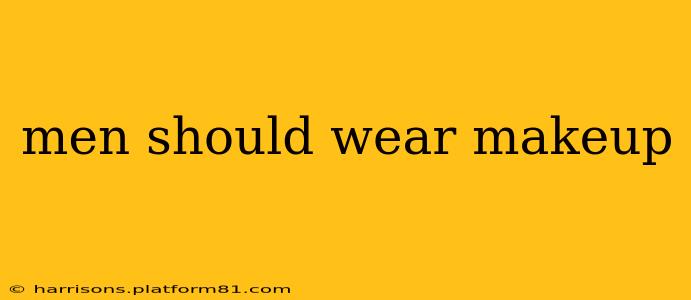The question of whether men should wear makeup is no longer a simple yes or no. It's a complex issue intertwined with evolving societal norms, individual expression, and the broader conversation surrounding masculinity. This isn't just about cosmetics; it's about challenging stereotypes and embracing a more inclusive definition of beauty. This article delves into the reasons why men might choose to wear makeup, the benefits they experience, and addresses common misconceptions surrounding this growing trend.
Why Are More Men Wearing Makeup?
The rise in men wearing makeup reflects a broader cultural shift. Men are increasingly comfortable expressing themselves authentically, breaking free from restrictive gender roles that dictate how they should look and behave. This is driven by several factors:
- Increased Representation: The media's portrayal of men wearing makeup is becoming more common, normalizing the practice and showing diverse examples of male beauty.
- Social Media Influence: Platforms like Instagram and TikTok showcase countless male makeup artists and influencers, demonstrating diverse techniques and styles. This creates a supportive community and makes it easier for men to explore their interest in makeup.
- Breaking Gender Stereotypes: More men are actively rejecting traditional notions of masculinity, choosing instead to express themselves through various means, including makeup.
- Self-Expression and Confidence: Makeup, for many men, is a tool for self-expression, allowing them to enhance their features, experiment with different looks, and boost their confidence.
What Are the Benefits of Men Wearing Makeup?
The benefits of wearing makeup extend beyond mere aesthetics. For many men, it's a powerful tool for:
- Enhanced Confidence: Feeling good about one's appearance can significantly impact self-esteem and confidence, leading to improved performance in both personal and professional settings.
- Creative Expression: Makeup allows for creative exploration and self-expression, providing an outlet for artistry and individuality.
- Professional Advantage (in some fields): In certain industries, a polished appearance, which may include makeup, can be advantageous for making a positive first impression. This is particularly true in fields like acting, modeling, and entertainment.
- Skincare Benefits: Some makeup products offer skincare benefits, such as sun protection or hydration, contributing to overall skin health.
Does Wearing Makeup Make a Man Less Masculine?
This is a common misconception. Masculinity is not a monolith; it's a spectrum of expressions. Wearing makeup doesn't inherently diminish a man's masculinity; rather, it challenges the narrow and often outdated definition of what it means to be a man. It's about embracing individuality and expressing oneself authentically, regardless of traditional gender norms.
What Types of Makeup Do Men Typically Wear?
The types of makeup men choose to wear vary greatly, depending on their personal preferences and desired outcome. Popular choices include:
- Concealer: To cover blemishes or dark circles.
- Foundation: To even out skin tone.
- Bronzer: To add warmth and definition.
- Eyebrow Gel: To groom and shape eyebrows.
- Lip Balm: To moisturize and protect lips.
How Can Men Get Started with Makeup?
Getting started with makeup can be simple and enjoyable. Many resources are available to help men navigate the world of cosmetics, including:
- YouTube Tutorials: Countless tutorials offer step-by-step guidance on various makeup techniques and looks.
- Makeup Counter Consultations: Department stores often offer consultations with makeup artists who can provide personalized advice and recommendations.
- Online Resources: Numerous websites and blogs cater specifically to men interested in makeup, offering product reviews, tips, and advice.
Is Makeup for Men a Trend or Here to Stay?
The increasing acceptance and normalization of men wearing makeup suggest it's far more than a fleeting trend. As societal views on masculinity continue to evolve, and as more men feel empowered to express themselves authentically, the use of makeup by men will likely remain a significant aspect of the beauty and self-care landscape.
In conclusion, the question of whether men should wear makeup is ultimately a personal one. The growing acceptance and normalization of this practice demonstrate a positive shift toward inclusivity and self-expression. It's a journey of self-discovery and empowerment, allowing men to redefine masculinity on their own terms and embrace a more diverse and expressive definition of beauty.
